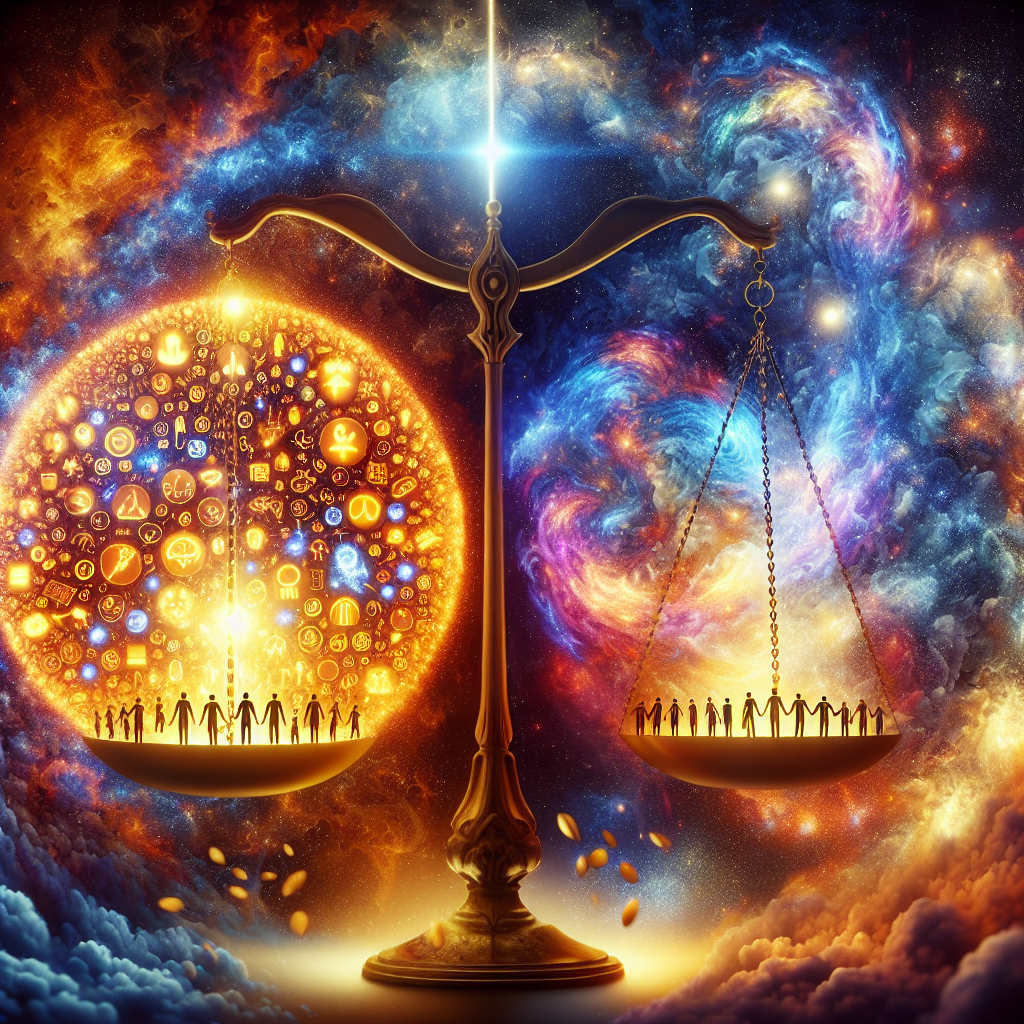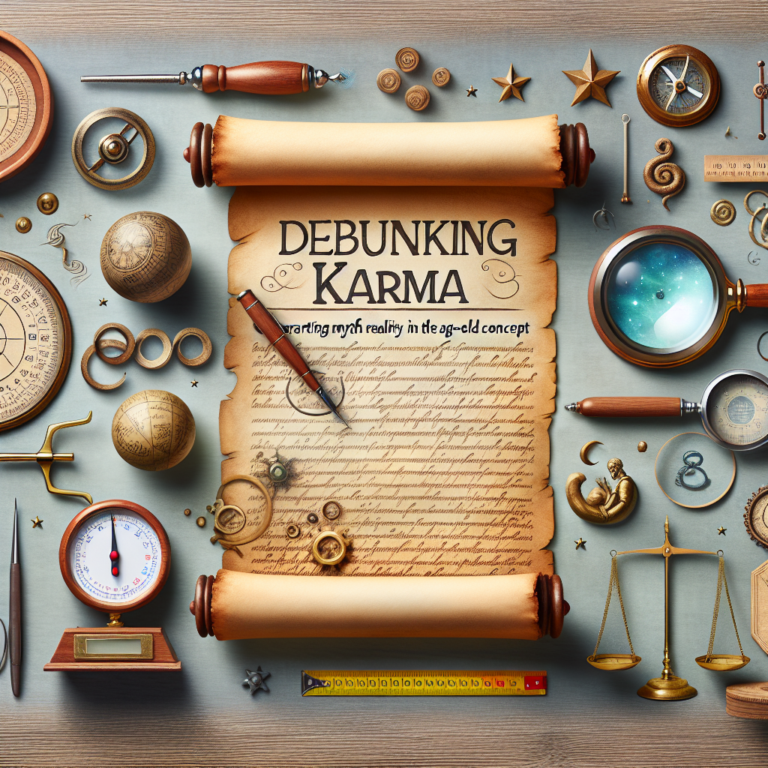Karma vs. Destiny: The Interplay Between Our Actions and Fate
The concepts of karma and destiny have intrigued humans for centuries. These ideas mingle through various cultures and philosophies, often inciting debates about moral responsibility and the nature of existence. While karma suggests that our actions directly influence our fate through a cycle of cause and effect, destiny often conveys a sense of predetermined paths shaped by forces beyond our control. This article explores these complex notions by examining their definitions, intersections, and implications for our lives.
Understanding Karma
Karma originates from ancient Indian philosophy, primarily within Hinduism and Buddhism. It refers to the principle of cause and effect, where every action has consequences that can manifest either in this lifetime or in future rebirths. There are generally three types of karma:
- Sanchita Karma – The accumulated karma from all past lives.
- Prarabdha Karma – The portion of Sanchita karma that is ripe for fruition in the current life. This karma affects the circumstances we find ourselves in today.
- Kriyamana Karma – The karma we create through our current thoughts and actions.
Fundamentally, karma emphasizes moral accountability. It compels us to consider the impact of our choices on ourselves and others. Unwholesome actions lead to negative repercussions, whereas positive deeds engender favorable results. Thus, karma embodies an ethical dimension, serving as a guiding principle for righteous living.
Understanding Destiny
Destiny, in contrast, refers to the idea that certain events and outcomes in life are preordained or unavoidable. This notion suggests that a larger cosmic or divine force governs our paths. Destiny is often linked to concepts of fate, fortune, or divine will, imparting a sense of inevitability to aspects of our existence, such as the circumstances of our birth or significant moments that shape our lives. While different cultures have their interpretations of destiny—whether it be through the framework of astrology, divine intervention, or mythology—the common thread is the idea that some elements of life transcend human control.
In many cases, the notion of destiny provides comfort. It suggests that regardless of the struggles one faces, there is a guiding force that shapes our journey, and often gives meaning to suffering or challenges. Destiny can evoke a blend of hope and resignation, as individuals wrestle with the idea of free will versus determinism.
Interplay Between Karma and Destiny
At first glance, karma and destiny might seem opposed. Karma emphasizes agency and consequences of individual actions, while destiny leans towards predetermination. However, a more nuanced understanding reveals that they are interconnected.
Karma Influences Destiny: Our actions (karma) can shape the experiences we encounter (destiny). For instance, if someone consistently engages in acts of kindness, they are likely to experience positive relationships and circumstances. Conversely, negative actions can lead to undesirable outcomes, illustrating how karma creates ripples that alter the course of one’s destiny.
Destiny Shapes Karma: Conversely, elements of our lives may be influenced by circumstances beyond our control. Certain challenging situations can be viewed as predetermined aspects of destiny, which can affect how we act in the world. For example, facing adversity may inform our karmic decisions, ultimately shaping our character and choices for the better.
- Balancing Agency and Acceptance: The interplay of karma and destiny urges a balance between taking proactive steps in shaping one’s life while also accepting certain limitations. Recognizing that some aspects of life are out of our hands can be liberating. It allows individuals to focus on what they can control—namely, their choices, attitudes, and interactions—while also cultivating resilience in facing the inevitable unpredictability of fate.
Practical Implications
Understanding the dynamics between karma and destiny carries profound implications for how we live our lives. Here are several ways these concepts interact within our daily experiences:
Ethical Living: Recognizing the influence of karma encourages ethical behavior. When we understand that our actions have consequences, we are motivated to act with integrity and compassion.
Personal Growth: Engaging with the idea of karma encourages self-reflection. By observing the outcomes of our actions, we can learn, adapt, and grow, fostering personal development that aligns with a greater moral purpose.
Coping with Challenges: When individuals face hardships or events that seem predetermined, the concept of destiny can provide solace. It can be liberating to accept that some things are out of our control, allowing for healing and peace amid life’s trials.
Empowerment: Understanding karma reminds us that we have agency. Our choices matter, and we can rewrite narratives, impacting our present and future while contributing positively to the world around us.
- Navigating Relationships: The interplay between karma and destiny can enrich our interactions with others. Knowing that our actions can significantly affect those around us, we can strive to foster deeper connections based on empathy and mutual respect.
Conclusion
Karma and destiny are not merely philosophical concepts; they are essential frameworks that influence our interpretations of the world and our place within it. Understanding their interplay invites us to acknowledge our role in shaping our experiences while recognizing the complexities of life’s journey. By embracing both the agency of our actions and accepting certain aspects of fate, we can navigate existence with greater wisdom, compassion, and resilience.
FAQs
Q1: Can karma change destiny?
Yes, karma can influence our destiny because our actions and intentions can create positive or negative outcomes that affect the course of our lives.
Q2: Is karma only applicable to individuals?
While the primary focus is on individual actions, collective karma can also exist within communities or societies, reflecting shared actions and consequences.
Q3: How do I know if I’m experiencing the effects of karma?
The manifestation of karma can be observed through patterns in your life and relationships—positive or negative experiences that correlate with past actions and decisions.
Q4: Can destiny be altered?
While certain aspects of destiny may be seen as fixed, individuals can adapt their responses and choices based on their understanding of karma, potentially influencing their broader life path.
Q5: Are karma and destiny universally accepted concepts?
Karma and destiny are interpreted differently across cultures and belief systems, and while many find value in these ideas, their acceptance and meaning can vary widely among individuals.
It seems like you might be asking for a writing prompt or a specific topic to explore. Could you please provide more details or clarify what kind of prompt you’re looking for? Whether it’s for a story, an essay, or something else, I’m here to help!, #Karma #Destiny #Interplay #Actions #Fate, #Karma #Destiny #Interplay #Actions #Fate, 1735002283, karma-vs-destiny-the-interplay-between-our-actions-and-fate





